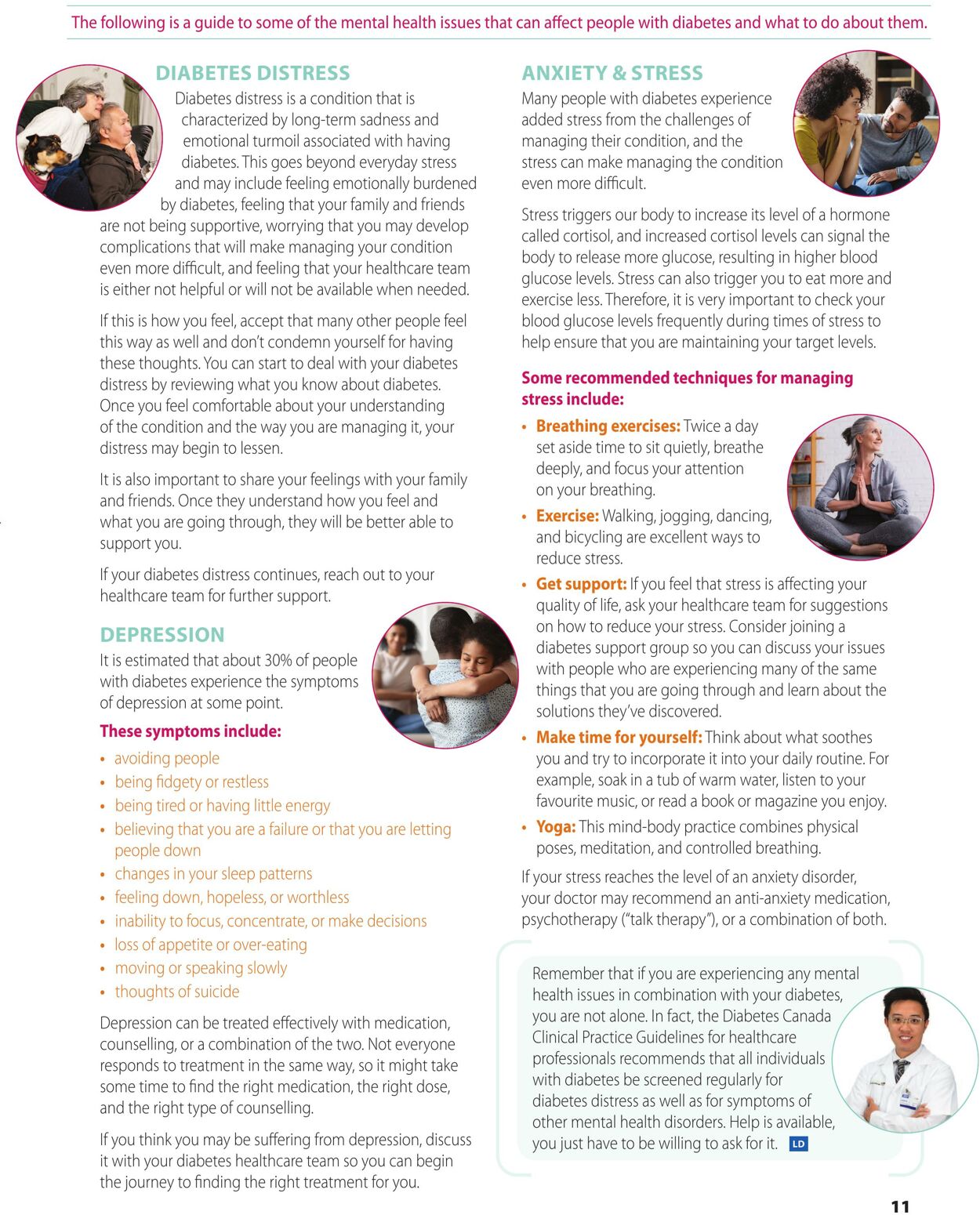













Products in this flyer
The following is a guide to some of the mental health issues that can affect people with diabetes and what to do about them. DIABETES DISTRESS Diabetes distress is a condition that is characterized by long-term sadness and emotional turmoil associated with having diabetes. This goes beyond everyday stress and may include feeling emotionally burdened by diabetes, feeling that your family and friends are not being supportive, worrying that you may develop complications that will make managing your condition even more difficult, and feeling that your healthcare team is either not helpful or will not be available when needed. If this is how you feel, accept that many other people feel this way as well and don’t condemn yourself for having these thoughts. You can start to deal with your diabetes distress by reviewing what you know about diabetes. Once you feel comfortable about your understanding of the condition and the way you are managing it, your distress may begin to lessen. [tis also important to share your feelings with your family and friends. Once they understand how you feel and what you are going through, they will be better able to support you. If your diabetes distress continues, reach out to your healthcare team for further support. DEPRESSION Itis estimated that about 30% of people with diabetes experience the symptoms of depression at some point. These symptoms include: * avoiding people being fidgety or restless being tired or having little energy believing that you are a failure or that you are letting people down changes in your sleep patterns feeling down, hopeless, or worthless inability to focus, concentrate, or make decisions loss of appetite or over-eating moving or speaking slowly thoughts of suicide Depression can be treated effectively with medication, counselling, or a combination of the two. Not everyone responds to treatment in the same way, so it might take some time to find the right medication, the right dose, and the right type of counselling. If you think you may be suffering from depression, discuss it with your diabetes healthcare team so you can begin the journey to finding the right treatment for you. ANXIETY & STRESS Many people with diabetes experience added stress from the challenges of managing their condition, and the stress can make managing the condition even more difficult. Stress triggers our body to increase its level of a hormone called cortisol, and increased cortisol levels can signal the body to release more glucose, resulting in higher blood glucose levels. Stress can also trigger you to eat more and exercise less. Therefore, it is very important to check your blood glucose levels frequently during times of stress to help ensure that you are maintaining your target levels. Some recommended techniques for managing stress include: Breathing exercises: Twice a day set aside time to sit quietly, breathe deeply, and focus your attention on your breathing. Exercise: Walking, jogging, dancing, and bicycling are excellent ways to reduce stress. Get support: If you feel that stress is affecting your quality of life, ask your healthcare team for suggestions on how to reduce your stress. Consider joining a diabetes support group so you can discuss your issues with people who are experiencing many of the same things that you are going through and learn about the solutions they've discovered. Make time for yourself: Think about what soothes you and try to incorporate it into your daily routine. For example, soak in a tub of warm water, listen to your favourite music, or read a book or magazine you enjoy. Yoga: This mind-body practice combines physical poses, meditation, and controlled breathing. If your stress reaches the level of an anxiety disorder, your doctor may recommend an anti-anxiety medication, psychotherapy (“talk therapy”), or a combination of both. Remember that if you are experiencing any mental health issues in combination with your diabetes, _ you are not alone. In fact, the Diabetes Canada / Clinical Practice Guidelines for healthcare / professionals recommends that all individuals | with diabetes be screened regularly for \ diabetes distress as well as for symptoms of \ t other mental health disorders. Help is available, “S you just have to be willing to ask for it. * ~~
| Name | Details |
|---|